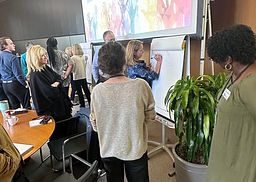Leadership Summit Engages PAEA Leaders in Conversations About Race, Diversity, Equity, Inclusion, and Belonging
Nothing good comes from avoiding talking about racism.
Theresa M. Robinson, Leadership Summit Facilitator
More than 100 PAEA volunteers representing about 70 programs from across the country came together in Washington, DC, in April, for a Leadership Summit. The gathering offered a training focused on “Everyday Inclusion and Equity.”
Through several small and large group activities, participants were able to share personal experiences, learn from peers, and engage in dialogue that advanced the conversation of how to combat racism in PA education. Attendees also left with accountability partners to develop action steps for educators within PA programs to create equitable, diverse, and inclusive environments for faculty, staff, and students.
The training was facilitated by Association for Talent Development (ATD) Certified Master Trainer, facilitator, keynote speaker, coach, course creator, author, and president of Master Trainer TMR & Associates, LLC, Theresa M. Robinson.
Marc Doobay, MPAS PA-C clinical assistant professor, at the University of Iowa PA Program, said he was grateful for opportunities like the Leadership Summit which came from his position serving on the PAEA Governance and Ethics Board.
“Truth be told, it was at the Leadership Summit that I truly began my journey to becoming the educator I’ve always wanted to be,” he said.
This day-and-a-half long interactive training event was organized in line with PAEA’s vision of “Health for all” and our mission of advancing excellence in PA education through leadership, scholarship, equity, and inclusion. The workshop opened with an evening welcome reception for all attendees.
Prior to attending the Summit, participants completed a one-hour webinar that provided the foundation for the larger conversation in DC. In addition, each participant completed a short survey to gauge members’ understanding and purpose of equity, diversity, and inclusion in PA education.
Below are three key takeaways from the event:
- The house is on fire. Imagine a small, diverse community of houses. Some houses have missing tiles in the kitchen, some have leaky roofs, and some need new paint. But one of the houses is on fire. The priority of the community needs to be putting out that fire as soon as possible. In this example, racial injustice is represented by the house on fire. There are many issues that need to be solved in society, just as there are many houses in this imaginary community that need inspection and touch-ups. However, just as your first priority in the neighborhood would be extinguishing the fire, anti-racism is priority number one for the good of all in our real world community.
- Intent over impact causes additional harm for people already harmed by racism. It is crucial to understated the harm that words and actions can have on individuals rather than focusing on what the intent may have been.
- There are many variables to inclusive environments. Programs must intentionally create spaces of inclusion and belonging for faculty, staff, and students before bringing members from diverse backgrounds into these spaces.
To continue this work, PAEA will provide opportunities for virtual dialogues on the critical topics presented at the Leadership Summit, open to all members, regardless of attendance at the April event.
Volunteering with PAEA
Doobay said he volunteers for PAEA as a measure of gratitude for the resources the association has provided him and his colleagues, institution, and learners.
“This volunteer work has afforded me the opportunity to join established and emerging leaders in PA education at the Leadership Summit. They call it a ‘summit’, but it’s really so much more than that. It’s a safe space to workshop and creatively brainstorm solutions to the challenges we face at our institutions and throughout our profession as a whole. It’s a place to conceive new ideas, explore biases, sit with discomfort, and discover a call to action,” he said.







